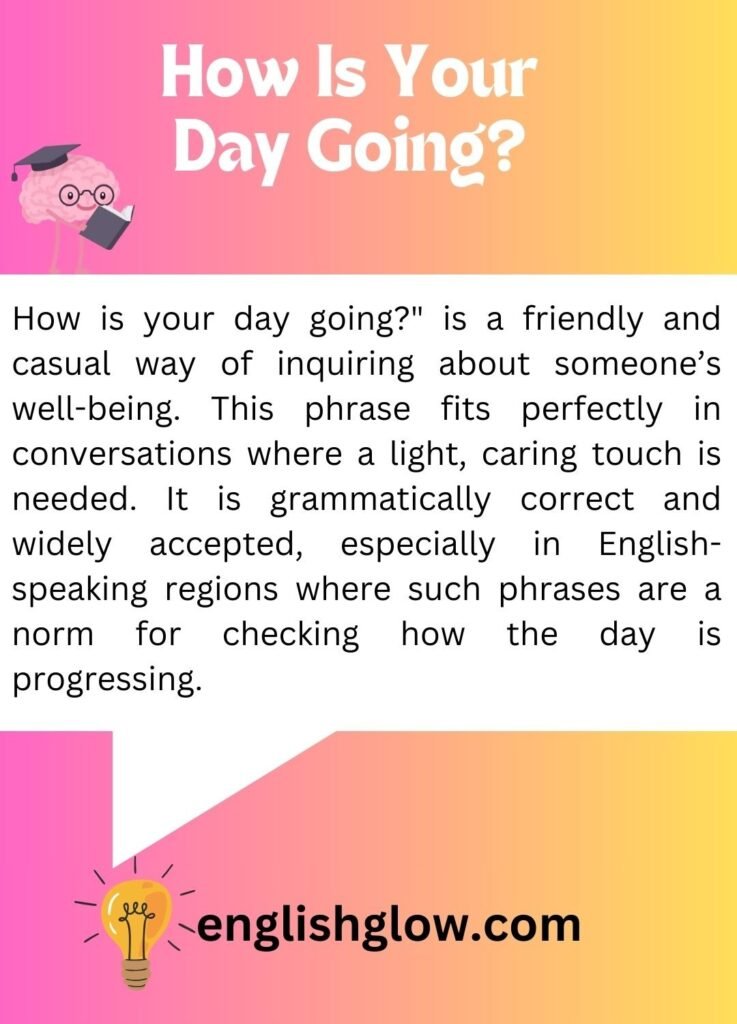How is your day going?” — a phrase we hear almost daily. When someone asks this, they are not just making casual conversation. They are showing concern for your well-being, checking on your state and progressing the day. It’s a polite, friendly way to connect on a personal level. In English-speaking countries, this greeting is commonly used to start a conversation and show a general interest in the lives of others.
The origin of this greeting might not be specific or exact, but it aligns with the practice of expressing concern and interest in others’ lives. Whether the response is “Good,” “Great,” or even “Can’t complain,” each answer provides an opportunity to share updates, highlights, and challenges that have occurred throughout the day. It’s fascinating how this simple question has become a conversational cornerstone, allowing us to navigate the myriad of ways people respond, reflecting their mood and daily experiences. It can feel daunting sometimes, yet it always serves as a way to engage in deeper dialogue and provide tailored responses based on the context, from professional environments to intimate conversations with loved ones.
Understanding the Question
When someone asks, “How is your day going?”, it might seem like just one of many casual greetings or mere pleasantries. However, this question does more than just fill a silence; it serves as social glue, facilitating connections and smoothing the pathway to further interaction. It allows people to reveal much about the nature of their relationship and the social context they find themselves in.
Through this simple inquiry, we gauge not just the details of a person’s day but also their willingness to engage. It’s a way to test the waters of a conversation—how deep or light it will be. As someone who frequently navigates both personal and professional settings, understanding the layers behind this question helps in tailoring my approach to each interaction, ensuring that my responses foster the kind of connection appropriate for the situation at hand.
Is it correct to say, “How is your day going?”

How is your day going?” is a friendly and casual way of inquiring about someone’s well-being. This phrase fits perfectly in conversations where a light, caring touch is needed. It is grammatically correct and widely accepted, especially in English-speaking regions where such phrases are a norm for checking how the day is progressing.
The use of this phrase may vary by cultural and regional context. In some cultures, such direct questions about personal matters are less common, and more general greetings might be preferred. However, in many parts of the world, asking “How is your day going?” is seen as a good practice, reflecting genuine concern and an effort to maintain a relationship. It’s always wise to consider the language norms and the depth of your relationship when choosing how to use this phrase.
Practical Insights on Using “How is Your Day Going?”
- “How is your day going?” is a common greeting used to inquire about someone’s well-being.
- It is a friendly and casual way to start a conversation and show that you care about the other person’s feelings.
- This question can help you connect with others on a more personal level.
- It can make the other person feel important and valued.
- It shows that you are interested in the other person’s experiences and are willing to listen.
- It can be a nice gesture to check in on someone’s mood and see if they need any support.
- This question can be a good way to show empathy towards someone who may be going through a tough time.
- It can open the door for a deeper conversation about how the person is really feeling.
- Asking “How is your day going?” can help build trust and rapport with the other person.
- It can be a simple way to show kindness and compassion towards others.
- This question can lead to a more meaningful and authentic interaction.
- It is a great way to show that you are attentive and care about the other person’s well-being.
- It can help you understand the other person’s perspective and gain insights into their feelings.
- This question can be a good way to start a positive and uplifting conversation.
- It is a thoughtful gesture that can make someone feel seen and heard.
- Asking “How is your day going?” can help you create a more supportive and nurturing environment.
- It can be a way to show that you value the other person’s opinions and experiences.
- This question can help foster stronger relationships and connections with others.
- It is a simple but effective way to show that you are interested in the other person’s life.
- Asking “How is your day going?” can help you practice active listening and empathy.
- It is a great conversation starter that can lead to more meaningful interactions.
- This question can help you show your support and care for the other person.
- It is a positive and encouraging way to engage with others.
- It is a way to show that you are present and focused on the other person’s needs.
- This question can help you create a warm and welcoming atmosphere in your conversations.
- It is a way to demonstrate your willingness to connect with others on an emotional level.
- Asking “How is your day going?” can help you establish a sense of camaraderie and understanding with the other person.
- It is a simple but powerful way to show that you value the other person’s well-being and happiness.
You might also enjoy: Copys or Copies: The Simple Trick to Never Get It Wrong
When can we use “How is your day going?”
We can use “How is your day going?” as a friendly and casual conversation starter to express interest in someone’s experiences and feelings. It’s perfect for checking in on others, fostering a sense of connection, and showing that you care about their well-being.
Engaging in casual conversations

Engaging in casual conversations, especially with acquaintances, requires a balance of being polite and friendly while maintaining social niceties. The aim is to keep the interaction light and pleasant without oversharing personal information. Responses should be guarded enough to respect boundaries, yet open-ended enough to allow for engaging exchanges. Phrases like “Going well, thanks!” or “Pretty good, just keeping busy,” provide a brief yet sufficient glimpse into your life, fostering a polite and sociable exchange.
When someone asks, “How is your day going?” they’re typically not looking for detailed stories. Instead, they’re forming a friendly connection through typical yet pleasant replies. Whether the conversation extends or remains brief, responses like “Can’t complain, just the usual day-to-day tasks,” or “So far, so good, enjoying the weather,” keep the dialogue friendly and respectful. This approach allows each person to share comfortably within the context of their relationship, enhancing the interaction without pushing beyond comfortable social boundaries.
Catching up with friends or family

When catching up with friends or family, “How is your day going?” serves as a natural question to start conversations. It’s a gateway to more genuine emotional exchange where the responses can be as varied as the experiences of the day. This question allows people to share their recent activities, joys, and challenges, making it not just a routine check-in but a bridge to deeper connections. Whether you’re interacting in person or over a call, this inquiry sets the tone for an open and engaging dialogue, reflecting trust and intimacy that characterizes close relationships.
In such settings, the responses are often more personal and detailed, offering a mix of victories and challenges. For example, replies like “Been on a rollercoaster lately, but hanging in there” or “Got some amazing news today, can’t wait to share it with you later” enrich the conversation, fostering an environment of support and empathy. This openness is crucial for navigating life’s ups and downs together, strengthening the bonds through shared experiences.
Moreover, this question can be an emotional lifeline for those seeking support or an opportunity to express themselves fully. Responses like “It’s been a challenging day, but learning a lot” invite further engagement from the listener, who can offer comfort or advice. Such interactions highlight the importance of maintaining strong relationships and provide a sense of belonging and understanding, crucial for emotional well-being.
Fostering Connection through Empathy
Asking “How is your day going?” is more than a mere formality; it shows you value the experiences and emotions of the person you’re engaging with. It provides an opportunity for others to share the highlights and challenges they have encountered throughout their day. This question acts as a gentle invitation for someone to open up about their day, allowing for a meaningful exchange that goes beyond surface-level interactions.
This simple inquiry can deeply resonate with someone, especially if they are facing significant challenges. It shows that you are there to listen and that you genuinely care about their well-being. By asking about someone’s day, you offer a safe space for them to express themselves freely, which can be particularly comforting. It’s a powerful way to demonstrate empathy and build a connection that emphasizes the value of their experiences and emotions.
In Professional Settings
In professional settings, asking “How is your day going?” serves as a perfect opener to foster positive work relationships and showcase a proactive and productive attitude. This seemingly simple question offers a balanced opportunity to share experiences while maintaining professionalism. It allows individuals to briefly highlight their busy day, achievements, or how they are tackling their to-do list, promoting a reciprocal professional relationship. This approach not only encourages collegiality but also facilitates networking opportunities within a positive work environment.
Moreover, responses in such contexts are often crafted to be productive and reflect a proactive attitude, conveying contributions and commitment to work. For example, a reply might be, “It’s been a busy week, but I’m excited about the progress we’re making on the new project,” or “I’m implementing new systems, which is a great learning curve but very fulfilling.” These kinds of responses not only keep the conversation professional and respectful but also open doors for discussing professional growth and workday dynamics, which can significantly enhance collegial bonds and promote a supportive atmosphere.
Expressing concern or support

When asking “How is your day going?” in a context where you know someone is dealing with a particular situation, this question can open the door for them to share their thoughts and feelings, and for you to offer support or assistance if needed. It’s essential to consider the context and your relationship with the person you’re speaking to, ensuring the inquiry is friendly, well-intentioned, important, sensitive, and respectful to their current circumstances, thereby enhancing the effectiveness of your concern and support
When Not to Use “How Is Your Day Going”
In some contexts, the seemingly casual question “How is your day going?” can be inappropriate or insensitive. While common in many casual interactions, it might not suit situations where a person is clearly undergoing significant stress or grief. For example, during a crisis, a serious business meeting, or immediately after a tragic event, asking such a question could seem out of touch with the gravity of the circumstances. In these cases, it’s more thoughtful to use specific inquiries or expressions of support that acknowledge the person’s current experiences.
When it’s clear their day is going poorly
When you can tell that someone is having a rough day, it’s essential to be considerate. Instead of simply asking, “How is your day going?” which might prompt them to relive their negative experience, a more supportive approach involves directly offering help. You might ask, “Is there anything I can do to help?” or offer specific forms of support. This way, you show that you’ve shared their concern and are ready to assist, rather than leaving them to deal with their struggles alone.
My suggestions for responding to “How is your day going?”
- When someone asks, “How is your day going?” it’s an opportunity to connect with them on a personal level.
- You can keep your response simple yet positive by saying something like, “My day is going great, thank you for asking!”
- If your day has been wonderful so far, you might reply, “It’s been a wonderful day so far, thanks!”
- For those days when everything seems to be falling into place, you could say, “I’m having a fantastic day; how about you?”
- This approach keeps the conversation warm and inviting, allowing for a natural flow and a genuine exchange of feelings.
- On days when things are going smoothly, a response like, “My day is going smoothly; I appreciate you asking,” can convey calm contentment.
- If your day has been filled with positive moments, consider saying, “It’s been a lovely day filled with positive moments.”
- This not only shares your own experience but also leaves room for the other person to share theirs.
- Whether your day has been productive and enjoyable or simply good overall, keeping your response thoughtful and personal will make the exchange more meaningful for both of you.
You might enjoy reading: You Won’t Believe How ‘There Once Was a Girl From Nantucket’ Ends
My alternatives to “How is your day going?”:

- Instead of the usual “How is your day going?”, you can ask, “How has your day been so far?” or “How is your day unfolding?” to keep the conversation engaging.
- For a more personal touch, try asking, “How has your day treated you?” or “How are things going for you today?” These alternatives create a supportive and caring tone.
- If you’re interested in the person’s ongoing experience, consider asking, “How is your day progressing?” or “How is your day shaping up?” to encourage a deeper response.
- To add variety, you might say, “How is your day panning out?” or “How is your day coming along?” showing that you care about the person’s experience.
- Asking, “How is your day unfolding thus far?” or “How is your day going up until now?” can help you connect on a more personal level.
- In a work setting, asking, “How has your day been treating you?” or “How is your day looking so far?” shows interest in the person’s well-being.
- When checking in with friends, “How is your day turning out?” or “How is your day developing?” can lead to more meaningful conversations.
- Use, “How is your day transpiring?” or “How is your day going on your end?” to foster a deeper connection.
- During a mentorship meeting, asking, “How is your day progressing along your journey?” or “How has your day unfolded up to this point?” shows you care about their overall experience.
- In a supportive setting, asking, “How is your day shaping up for you?” or “How is your day progressing on your side?” can help build rapport.
- If you want to check in with someone, ask, “How is your day going in your world?” or “How is your day treating you thus far?” to show empathy.
- Use, “How is your day advancing for you?” or “How is your day moving along?” to express genuine concern.
- In a relaxed environment, asking, “How has your day been going for you?” or “How is your day playing out?” can make the conversation flow more naturally.
- To maintain a friendly tone, try, “How is your day turning out for you?” or “How is your day moving forward?”
- Finally, asking, “How is your day going on your part?” can provide a thoughtful and considerate way to check in with someone.
Asking “How is your day going?” in Social Settings
In social contexts, asking “How is your day going?” is a common and casual way to inquire about someone’s well-being and current experiences. It’s often used as a friendly conversation starter. For example, you might say, “Hey, haven’t seen you in a while! Anything exciting happening?” or “Just wanted to check and see if everything is alright.” This question can also be a way to catch up with someone, like saying, “Hope you’re having a great day so far, want to grab a coffee and chat?” It’s a simple way to ask if they need any help or just to say hello. It’s interesting how this question can lead to noteworthy discussions, especially when you’re curious about their day and if they’d like to share more
Fun Ways to Respond to “How is Your Day Going?”
When someone asks how your day is going and you want to respond with something more fun and lighthearted, there are plenty of options. You could say, “Well, I think I might break into a spontaneous dance routine any moment!” or “It’s been a real rollercoaster—I’m enjoying the ride!” If you’re in a playful mood, you might say, “Things are going swimmingly, although I haven’t actually been swimming yet!” Or, keep it humorous with, “My day feels like a comedy show, full of unexpected twists and hilarious moments.”
For those days when you’re feeling especially positive, try responding with, “It’s going fabulously; I’m spreading smiles like confetti!” or “So far, it’s been magical—I’ve got a pocketful of pixie dust.” If you’re in the mood for a fun twist, you could say, “I’m on a mission to find the world’s best cupcake!” or “It’s like a carnival ride—thrilling and dizzying, but definitely fun!” These responses are great for keeping things light-hearted and playful, perfectly adjusting to your personality and sense of humour while also acknowledging the inquiry. And when you’re feeling like a hero, “I’m embracing my inner superhero, saving the world one task at a time,” is sure to bring a smile.
Frequently Asked Questions
What does the phrase “How is your day going?” mean?
- Answer: It’s a common English greeting used to inquire about someone’s well-being and how their day is progressing.
How long has this phrase been used?
- Answer: It has likely been used for a long time, but it has gained more popularity in recent years as a casual and friendly way to start conversations.
Are there similar greetings in other languages?
- Answer: Yes, many languages have similar greetings that express the same sentiment of checking in on someone’s day.
Has the phrase evolved over time?
- Answer: The phrase has evolved in terms of the contexts and settings in which it is used, but it still focuses on showing concern for someone’s well-being.
Conclusion
Polite questions like “How is your day going?” are great ways to show you value and care about the other person. You can use this question to start a conversation or to simply check in on a friend, family member, coworker, or even a stranger. It works well in both formal and informal contexts and situations. Whether you know the person well or are meeting someone for the first time, feel free to use this question frequently in various settings.
Navigating this question with tact and awareness can transform a simple exchange into an opportunity for a deeper connection. Tailoring your response to the context and relationship with the asker can ensure that your daily interactions are not only polite but also enriching. By being mindful of the context and the relationship, you can make sure that these exchanges are meaningful and add value to your daily interactions.
You might enjoy reading: How Does It Work or How It Works? Uncover the Key Difference Now!

